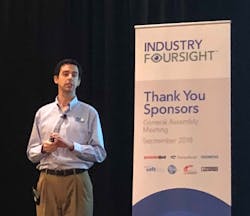Recently, I attended the PI North America general assembly meeting, a gathering of individuals representing the member organizations of this fieldbus community, who come together to get an update on new developments within the group, as well as how industry trends are impacting the evolution of Profibus and Profinet.
Of particular interest this year, is the emergence of time-sensitive networking (TSN) on the factory floor. Specifically, the industry as a whole has been investigating how this IEEE set of standards can turn Ethernet into a deterministic network, thereby enabling real-time industrial applications—sans the proprietary protocols of the past.
The technology will enable the consolidation of multiple services over a single, standard physical network, which will help manufacturers who are trying to figure out how to deal with the Industrial Internet of Things (IIoT) and the of convergence of IT and OT. However, it also has the potential to eclipse the existing fieldbus landscape—that lower communication layer that has historically delivered all of the deterministic capabilities that TSN promises, but using different flavors of Ethernet. For example, while different suppliers offer industrial Ethernet networks, they are still based on conflicting connectivity methods that make data exchange difficult.
Recently, however, OPC Foundations’ OPC UA, an open communication protocol for information exchange between machines as well as up into the enterprise, evolved from a client/server architecture to a publish/subscribe (Pub/Sub) set-up, which enables mapping to TSN. Together, the technologies are well positioned to efficiently exchange IIoT data from the device to the cloud.
The question now is: Will OPC UA over TSN make existing versions of industrial Ethernet obsolete? According to Michael Bowne, executive director of PI North America, the answer—at least for Profinet—is “no.”
In a recent Automation World column, “Not Your Father’s Fieldbus,” Bowne noted that Profinet and OPC UA Pub/Sub are complementary technologies, not competing ones. And, during the general assembly, Bowne expanded on the idea that TSN, in theory, levels the fieldbus playing field, but there is value-add in Profinet. “The fieldbuses of today do more than just move data,” Bowne said. There is diagnostics, safety, configuration, etc. “Not all protocols situated for the same task are created equal,” he said.
That doesn’t mean, however, that PI North America is ignoring OPC UA over TSN and the building momentum behind a unified initiative from another group of over a dozen companies—informally known as the “shapers.”—including ABB, Cisco, Schneider Electric and Rockwell among others, This collaboration of companies is pushing for an open, standards-based way for real-time communication between industrial controllers and the cloud, and they are turning to OPC UA TSN as the unified standard for automation and IIoT connectivity. With testbeds underway, the group is working on future products that comply with this next-generation technology.
But PI North America is also working on integrating the TSN standard into Profinet, with the spec scheduled for release in April 2019 and the first products hitting the market in 2020. The goal, again, is to maintain the sustainability of the fieldbus by focusing on what it does well, while supporting the additional capabilities of TSN. The Profinet TSN offering will be focused on easing the efforts of integration with a “plug and work network.” The architecture of Profinet with TSN will include services for configuration, parameterization, diagnostics, easy TSN network configuration, flexible topologies and scalability.
Read about Siemens' TSN strategy via Profinet and OPC UA.
Clearly, there is still a lot to be done in the different communication camps, and years before the manufacturing industry will begin to experience any effects of the current efforts. In all honesty, I walked away from the PI general assembly meeting still slightly (or very) confused as to where everyone stands and what it all means.
While it all sounds promising, my hope is that we are not on the verge of yet another fieldbus war.
Leaders relevant to this article:

